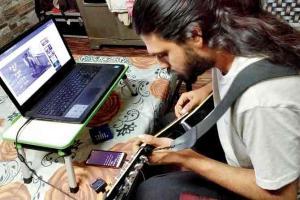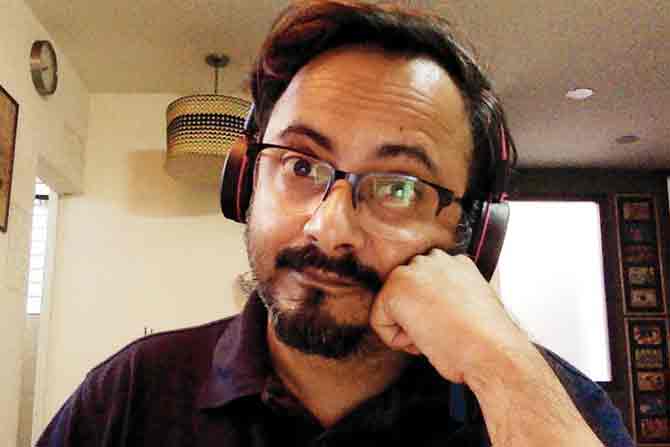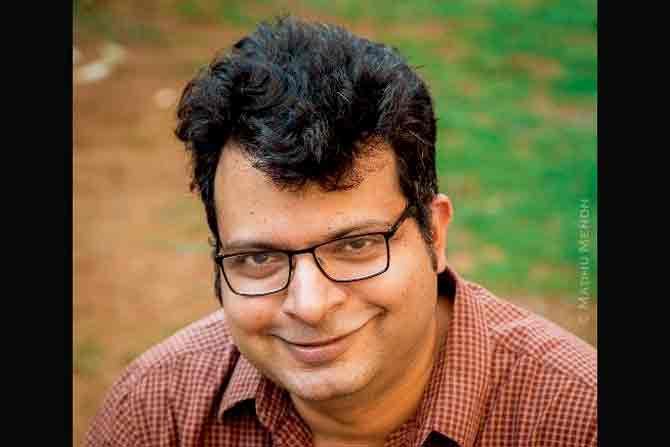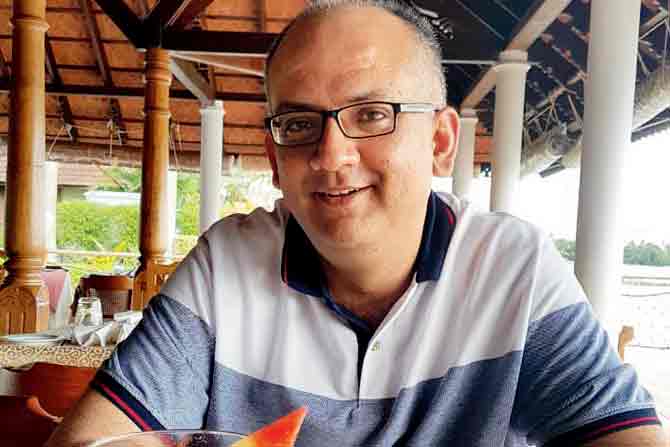Indie podcasters negotiating digital fatigue in the extended lockdown, explain the non-monetary motivation behind sitting in an empty room and talking

Raman Iyer, Midnight Musings and the Mandolin; dedicated to horror, whodunits, Indian folklore. Pic courtesy/Roshni Devi
It's Day 144 since musician and raconteur Raman Iyer's Instagram page came into its own. Once a picture log of everything from the gigs and travels of his folk-fusion band Kabir Café to his experiments with cooking and lazy mornings spent with pets Pari and Kitappa, Iyer's page is now bursting with stories that the voracious reader grew up on. Every night, a little before the clock strikes 12, Iyer goes live to share these vignettes, accompanied by the sweet stringing of a mandolin. He has an ammo of stories—there are nights dedicated to horror, whodunits, others to the Jataka tales and Indian mythology. His show, aptly titled Midnight Musings and the Mandolin, is a podcast, and yet not. For starters, it's streaming on a platform that relies heavily on images, both still and moving. But, the only visual on this show is the black screen and likes, and emojis from people, joining his Insta Live.
A couple of weeks into the lockdown, when Mumbai was getting excited about Zoom calls and Google meetings, Iyer says he got a sense that this was going to be a way of life for a while, if not forever. "Because of this, digital fatigue would creep in very soon. The last thing one would want to do [after putting in a hard day's work], is look at the screen again," he says: That's how the idea of a podcast struck him.
While platforms like Anchor.fm, launched by Spotify, have made podcasting available and accessible to all—you can publish your own show by simply downloading the app—Iyer wanted to test new ground. "I am a live musician. I enjoy making listeners part of my story and music, and feeding off their energies. It's why I decided to convert an intensely visual medium like Instagram, where mindless scrolling has become the norm, into a space where you listen," he shares, adding that what makes the experience of not having to pre-record different, is that the live audience is generally forgiving of blunders. Over the last five months, he's had at least 30 people join him daily. This doesn't account for those who listen to his show later on IGTV, the video arm of the photo-sharing app.
Iyer is among several independent podcasters, who've taken a shine to this slowly-evolving medium to communicate with people during the pandemic, successfully.

Vishwajyoti Ghosh, Kissa Stories; short slice-of-life tales in colloquial Hindi and Urdu
For Vishwajyoti Ghosh, author of the political graphic novel Delhi Calm, it all boiled down to suddenly having a lot of time. The Delhi-based graphic artist and writer launched Kissa Stories—short slice-of-life tales in colloquial Hindi and Urdu—on June 22, across platforms, including Spotify and Google. Within a few weeks, it was in the top 10 Apple Podcasts in the fiction category. "I wanted to reach out to a larger audience; that's why a podcast," he says. Already eight episodes down, the short 20-minute tales, some of which include contributions translated by Ghosh, hark back to the kind of stories once aired on Vividh Bharati, leaving you warm and nostalgic. The background scores have all been edited electronically by Ghosh, drawing listeners into the world he creates. Using Anchor.fm, which he says is to podcasters what WordPress is to bloggers, made the process seamless. He says producing one episode takes 24 hours, including recording and mastering the audio. Why didn't he approach podcast networks to back his show? "I wasn't confident," he admits. "We all go through the same pangs as writers. I knew my stories were good, but I wasn't sure if anyone would invest in them."

Simona Tarron, THC HeartBytes; discusses recipes and food trivia, interviews with F&B guys
Unlike Ghosh who deferred backing because he wanted his content to speak for itself, Mumbai-based journalist, podcaster and voiceover artiste Simona Terron is wary of getting involved with the big players. Terron started her podcast THC HeartBytes over two years ago as WhatsApp audio notes, before publishing it on Spotify. Here, she discusses recipes and food trivia, and interviews cool folks across the food industry. "I'd rather struggle alone, than get sucked up by corporates to the point where my idea and content is no longer mine." She admits that it's hardly bringing in the money, but her passion for podcasting precedes the kickbacks. During the lockdown, Terron released a special lockdown series, which saw her reach out to small food chains and restaurants, including Melwyn D'Sa of Bandra's Hearsch Bakery, Lee Anne of Lee Anne's Kitchen in Andheri, and Atul Sahni of Pali Hill's famed Khane Khas, to understand what it takes to keep food businesses afloat in difficult times. Another life-changing experience happened during the pandemic. Terron quit smoking after 26 years. "It has been a struggle [to quit]. But, to give it up at a stressful time like this, made me doubly proud. I had shared a couple of posts related to this on Instagram, when a nicotine de-addiction coach from Melbourne named Adam [he refers to himself by his first name] messaged me. Adam himself had quit smoking after 19 years and wanted to help others who were struggling with it," she says. The two hit it off, and decided to launch The Happy Ex Smoker podcast. The first episode of the show, which went live on July 31, ran for about 57 minutes, recalls Terron. They spoke about "everything from replacing nicotine addiction with food addiction, to using analogies for fighting the urge to abuse nicotine, and the glamourisation of smoking in cinema and on TV".

Amit Varma. Picture courtesy/Madhu Menon
Journalist and podcaster Amit Varma says that podcasts are working now, more than ever, because people "crave deep content". In a recent post, titled Meditation on Form, on his newsletter The India Uncut, he shared how "the medium has something to do with this". "Podcasts have been around for a couple of decades, but think about when they took off: when smartphones became widespread… with smartphones, people started listening to podcasts in three situations: while commuting, working out or doing errands," Varma wrote. In the lockdown, what happened is that people spent more time doing the latter. Commuting practically didn't happen, anymore. "So, while there was an impression that people would have more time to listen to podcasts during the lockdown, that wasn't really the case. In fact, the numbers had dropped in the beginning, before picking up again," he says, in a telephonic chat. Having said that, those who listen to podcasts, are less distracted, than those scrolling for content on YouTube. "The convenience of these times is that there is nothing else fighting for your attention." Another thing that has worked in the favour of podcasters is that people have started listening at higher speeds—platforms allow you to adjust playback speed. "Our optimal talking speed is about 200 words a minute, but our brains can comprehend what we are listening to 500 words a minute. As people become regular listeners, they lift the speed a couple of notches and when that normalises, another couple of notches," says Varma, who recently did a three hour-long interview on Indian education with economist Karthik Muralidharan on his podcast, The Seen and the Unseen. "That [content] is around 45,000 words. You can technically listen to that interview in one-and-a-half-hours at double the speed.
Where else can you enjoy that kind of content, which is half a book size, in such a short span of time. There is scope for so much depth and nuance."

Vivek Kaul, econcentral.in; examines India’s hot happenings through the lens of economic thinking
On June 13, Varma along with economic commentator and author Vivek Kaul, started another podcast, econcentral.in, where they examine everything happening in India, through the lens of economic thinking, whether it is Mahendra Singh Dhoni and his retirement, the complexity of rebelling against the Gandhis, Arnab Goswami and the race to the bottom in Indian media, or the very obvious impact of banning Chinese goods. Kaul feels that the biggest challenge for independent podcasters today, is "how to make money?" "Amit and I love doing this. But, we have bills to pay. In the long run, one has to think how. Do you put it behind a paywall, do you crowdfund it, or do you take ads?" he says. There are networks that can take credit for having launched podcasting in India, but Kaul says, they don't have the money or rather, not enough. Even big players, only commission a few podcasts here and there, depending on the numbers. "It's also a function of expectation. A lot of people might not want to make money of it. They just like the idea of sitting in front of a mic in a lonely room, and talking about things. This might work for some, but not for everyone." An interesting medium like this one, he feels, deserves support. So, does the artiste, oiling it.
Keep scrolling to read more news
Catch up on all the latest Mumbai news, crime news, current affairs, and a complete guide from food to things to do and events across Mumbai. Also download the new mid-day Android and iOS apps to get latest updates.
Mid-Day is now on Telegram. Click here to join our channel (@middayinfomedialtd) and stay updated with the latest news
 Subscribe today by clicking the link and stay updated with the latest news!" Click here!
Subscribe today by clicking the link and stay updated with the latest news!" Click here!







